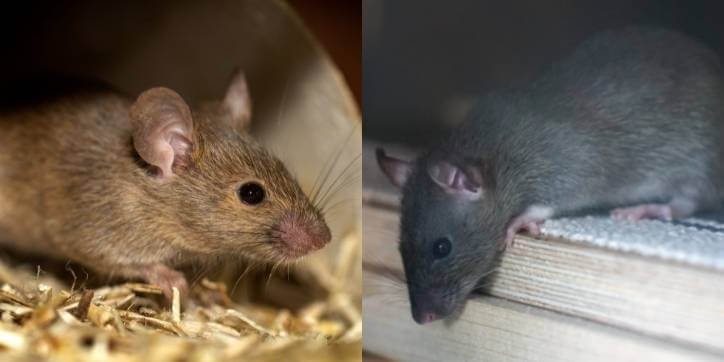What is the Difference Between a Mouse and a Rat?
While mice and rats fall into the rodent family, there are quite a few differences between them. Depending on which rodent species you are dealing with, you will want to choose different pest control methods to remove them. To solve your rodent problem, learn how to tell the difference between a rat and a mouse.
Table of Contents
- What is the Difference Between a Mouse and a Rat?
- Physical Characteristics
- Mouse Behavior vs. Rat Behavior
- Droppings
- Habitat, Breeding, and Diet
- Health Risks and Damage
- How Can AWPC Help with Mice and Rats?
Physical Characteristics
House Mouse
Norway Rat
Mouse Behavior vs. Rat Behavior
Droppings
Mouse Droppings
If you find piles of droppings roughly a quarter-inch in length with pointed ends, you likely have a mouse problem. Mouse droppings are often found near nests and food sources. They resemble black pieces of grain.
Rat Droppings
Rat droppings are less plentiful and are longer (three-quarters of an inch in length) with a wider, capsule-like appearance. They resemble large grains of rice.
Mouse Habitat, Breeding, and Diet
Mice are prolific breeders. A single female mouse can produce at least 30 to 60 pups each year. Mice usually live about 9 to 12 months but can live up to 3 years inside a house.
Rat Habitat, Breeding, and Diet
Rats are also prolific breeders. A single female rat can produce up to 80 offspring each year. Rats have shorter lifespans than mice. They usually live for about a year.
Health Risks and Damage
Damage Caused by Mice
Mice only need a quarter-inch opening to gain access into your home. Once inside, they will damage walls, furniture, ceilings, and attic insulation. Mice chew through wires, creating electrical issues and fire risks. They are also a significant public health pest. Mice contaminate stored food with droppings that can carry salmonella and hantavirus.
Damage Caused by Rats
Rats only need a half-inch opening to gain access into your home. They have strong front teeth, allowing them to chew through anything standing in their way. If a hole is too smaller, they can easily chew to make it larger. Once inside, they will damage walls, ceilings, furniture, and attic insulation. They are also a significant public health pest. Rats contaminate stored food with droppings that can carry hantavirus and salmonella. Rat bites can also lead to rate bite fever and plague.
How Can Advanced Wildlife and Pest Control Help with Mice and Rats?
If holes or openings aren’t closed, you will continue to have mice and rat problems. Our pest management professionals will seal up any entry points with heavy-duty sheet metal or wire mesh to prevent future rodent entry. Successful rodent control also requires ongoing maintenance. With our cold winters, your house will shift and create new openings. Our technicians perform quarterly checks to re-inspect your home and refill bait stations to keep your home and family protected against mice and rats year-round.
Have mice or rats in your home? Give us a call today at (262) 242-4390 or send us a message.

